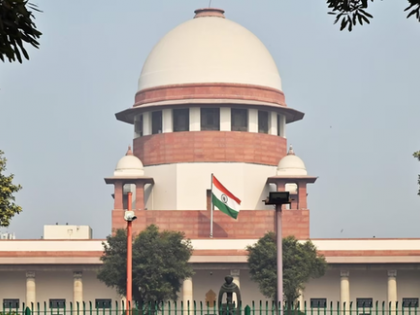CJI Gavai-led Bench to hear tomorrow pleas against Waqf Amendment Act
By IANS | Updated: May 14, 2025 21:32 IST2025-05-14T21:26:30+5:302025-05-14T21:32:44+5:30
New Delhi, May 14 The Supreme Court is slated to hear on Thursday a clutch of petitions challenging ...

CJI Gavai-led Bench to hear tomorrow pleas against Waqf Amendment Act
New Delhi, May 14 The Supreme Court is slated to hear on Thursday a clutch of petitions challenging the constitutional validity of the Waqf (Amendment) Act, 2025.
As per the cause list published on the apex court website, a 2-judge Bench headed by Chief Justice of India (CJI) BR Gavai and Justice AG Masih will resume hearing the matter on May 15.
Multiple petitions have been filed before the top court challenging the constitutional validity of the amendments introduced in the Waqf Act, 1995.
In the previous hearing held on May 5, a bench headed by ex-CJI Sanjiv Khanna opined that it did not intend to reserve its judgment at the interim stage in view of his impending retirement.
Adjourning the hearing, the Bench, also comprising Justices Sanjay Kumar and K.V. Viswanathan, said: "We will post it before the bench of Justice Gavai on May 13 or 14."
In an earlier hearing, the top court granted a week’s time to the Centre and state governments and the Waqf Boards to file their preliminary reply. It decided to treat five writ petitions as lead cases and said that other pleas will be treated as intervention applications, apart from ordering the registry to rename the cause titles of the proceedings as "In Re: The Waqf (Amendment) Act, 2025".
After the apex court hinted at passing a stay order, the Union government had assured the Supreme Court that it would not de-notify provisions related to 'Waqf by user' or include non-Muslim members in the Waqf Board. In its preliminary affidavit, the Centre said that it brought amendments to prevent abuse of Waqf legislation, which resulted in the encroachment of government properties, apart from ensuring that the Waqf Boards in the country are properly administered and function with transparency.
"It is submitted that there have been reported misuse of Waqf provisions to encroach on private properties and government properties. It is really shocking to know that after the amendment brought in the year 2013, there is a 116 per cent rise in Waqf area," the Union Ministry of Minority Affairs said.
The Centre, in its reply document filed before the top court, said that it was found that most of the Waqf Boards have been functioning in the "most non-transparent manner" and have either not uploaded the details in the public domain or have uploaded partial details. It said that under the old regime, due to the absence of adequate safeguards, government properties and even private properties were declared as Waqf properties.
"The provisions of Sections 3A, 3B, and 3C take care of the said situation, which has been prevailing for several decades. It is submitted that there are startling examples whereby the government lands or even the private lands were declared as Waqf properties," it said in the affidavit.
The Union government said that the Waqf (Amendment) Act, 2025, was passed with the objective of modernising the management of Waqf properties in India through transparent, efficient and inclusive measures. It argued that the reforms introduced are directed solely at the secular and administrative aspects of Waqf institutions – such as property management, record-keeping, and governance structures – without impinging upon any essential religious practices or tenets of the Islamic faith. The concept of ‘Waqf’, rooted in Islamic laws and traditions, refers to an endowment made by a Muslim for charitable or religious purposes, such as mosques, schools, hospitals, or other public institutions.
Disclaimer: This post has been auto-published from an agency feed without any modifications to the text and has not been reviewed by an editor
Open in app